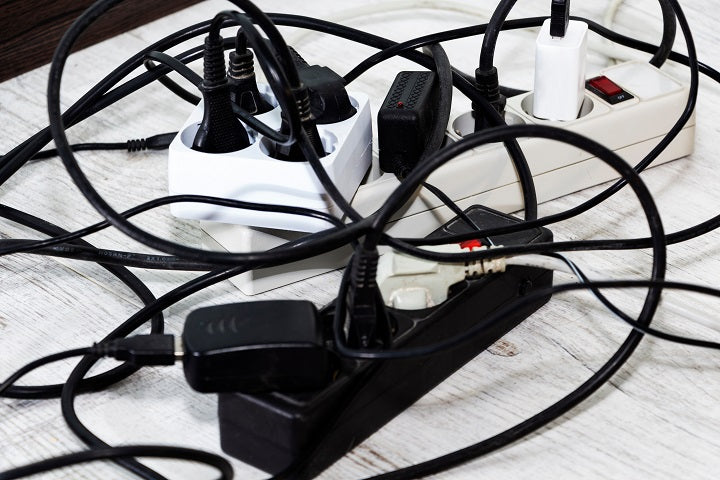Many homeowners mistakenly believe that a power surge can only be caused by a lightning strike. If the skies are sunny and there aren’t any storm clouds in sight, there’s no need to worry about a surge occurring in your family’s home, right? Wrong.
There are several potential causes of power surges. Regardless of what the cause may be, any time a surge occurs in your home, it could lead to severe damage of your appliances and electronic devices. This includes your TV, stereo, laptop or desktop computer, printer, as well as things like your phone, tablet, smart watch, etc., which may be plugged into a charging device.
What is a power surge?
A power surge is defined as a spike in voltage in the electric current running through your home. A number of factors could lead to these fluctuations with your home’s electricity. These include things like damaged wiring, a system overload, weather events, or even factors like tree limbs or wildlife touching the electric lines outside your home. Regardless of what the cause of the surge may be, you want to protect your home’s appliances and electronics from this type of event, which could cause irreparable or expensive damage.
Issues that could lead to spikes in voltage
Damaged wiring
If you have an appliance with frayed or exposed wiring, it’s not uncommon for a power surge to damage the plugged-in device. Sometimes, there may be even multiple power surges that occur each day if the appliance is left plugged in constantly.
When wiring is damaged or left exposed, it may not offer any electrical resistance. As a result, conductive materials could trigger a spike in the damaged wire’s current. Unfortunately, this is a common problem that often goes unnoticed in a home until a disaster such as a fire happens.
There are some warning signs you can watch for — things which could indicate an issue with a wired appliance. If the outlet that the device is plugged into feels hot to the touch, or has noticeable burn marks, this could indicate a problem. Additionally, if the outlet is making strange buzzing sounds, or has a burnt odor emanating from it, these are also common warning signs that all is not well with the wiring running from the appliance to the outlet.
If you happen to notice this problem in your home, unplug the appliance and contact a professional electrician immediately for assistance.
System overloads
Some appliances in your home use a substantial amount of electricity, including your refrigerator, washer, dryer, dishwasher, hair dryer, and kitchen appliances like blenders and food processors. When these appliances are used, it could lead to an abrupt spike in electricity use.
When this happens, the overload could cause a surge, as well as even a momentary blackout. These surge events could damage some of the other appliances in your home.
Some other causes of system overloads include the overuse of extension cords and having too many appliances/electronic devices plugged in at the same time. It may be a pain to remember, but always unplug appliances when you’re finished using them, such as your toaster, hair dryer, blender, coffee maker, etc.
Be mindful of which appliances you are using at the same time. For example, if you are doing laundry, try to refrain from also using your blender or food processor at the same time so you can try to prevent potential system overloads and surge events. Also, be aware of how many extension cords your family is using.
Weather events
While lightning strikes aren’t the only cause of power surges, they can be a cause of them. If lightning strikes your home’s electrical system, the excessive spike in voltage could cause major problems for your appliances and electronic devices. This is why it’s highly recommended that you unplug any appliances/electronics during severe weather. And for things that just can’t be unplugged, it’s recommended that you have a surge protection device in place.
External factors
If you have tree limbs that are growing close to power lines on your property, they may eventually come in contact with a line and lead to a spike in the electrical current running to your home. As a result, your home’s electronics may suffer damage from a power surge. Additionally, if wildlife (birds, squirrels, chipmunks, etc.) come in contact with the lines outside your home, it may generate the same result.
Have tree limbs trimmed by a professional on a regular basis to help prevent this common problem that often leads to damaging power surges.
Want affordable power surge protection?
At Pivotal Home Solutions, we offer both Surge Protection $2,000 and Surge Protection $4,000 plans. The plans offer reimbursement protection for residential electronics, electrical systems, appliances, and other electrical devices valued at $100 or more within your residence that fail due to electrical surges.
Have a question or want more information about our surge protection plans? Give us a call any time, or you can chat with a customer service representative during standard business hours by clicking the “Click to Chat” tab on the right side of the page.


